by Claire Chambers
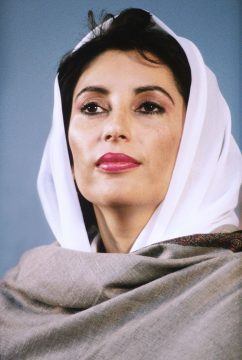
In my last post but one I pledged to continue my discussion of Benazir Bhutto’s two premierships and eventual assassination by examining the legacy she left behind for novelists to explore. Then, of course, the pandemic took hold, and I couldn’t not respond to the global health and welfare emergency. However, now the time seems right to keep my promise. The World Health Organization recently called for Pakistan to re-enter lockdown in some form following a terrifying upsurge of Covid-19 cases, an order that Imran Khan rejected on economic grounds. At a moment in history when Pakistan is crying out for decisive and empathetic leadership, let us consider the multilayered literary response to the country’s first and only female prime minister from three talented women writers.
In Maha Khan Phillips’ satirical novel Beautiful from this Angle (2010), the protagonist, Amynah, is a wealthy, well-educated socialite from Karachi. Amynah writes a scandalous gossip column, ‘Party Queen on the Scene’, but dreams of making a fortune through the publication of a fictional misery memoir about her oppression as a Muslim woman. Phillips intermixes reality and fabrication, as the novel culminates with Benazir Bhutto’s assassination on 27 December 2007.
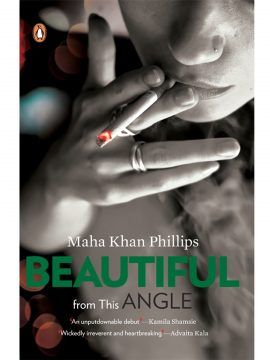 In Beautiful from this Angle news of the assassination comes near the novel’s end, to the shock of party-goers at an elite gathering in Karachi. The ‘tragedy’ of her murder cuts through the flirting, dancing, and cocaine consumption as if a bucket of ice-cold water has been thrown, in an instant sobering everyone up. There are groans, tears, and reminiscences about the Sindhi leader, who was known to the families of some of these young bluebloods. More practically, most of the revellers find themselves stranded at the party. They have to stay at the house overnight because Sindh, as Benazir’s home province, is already erupting with violence. One woman self-centredly worries that she is ‘really busted’, as she had told her parents she was having a quiet evening in with a girlfriend rather than attending this wild shindig.
In Beautiful from this Angle news of the assassination comes near the novel’s end, to the shock of party-goers at an elite gathering in Karachi. The ‘tragedy’ of her murder cuts through the flirting, dancing, and cocaine consumption as if a bucket of ice-cold water has been thrown, in an instant sobering everyone up. There are groans, tears, and reminiscences about the Sindhi leader, who was known to the families of some of these young bluebloods. More practically, most of the revellers find themselves stranded at the party. They have to stay at the house overnight because Sindh, as Benazir’s home province, is already erupting with violence. One woman self-centredly worries that she is ‘really busted’, as she had told her parents she was having a quiet evening in with a girlfriend rather than attending this wild shindig.
It is then that Amynah learns one of her best friends, Mumtaz, has been slain in the same bomb blast that killed Benazir. Mumtaz had joined Benazir’s Pakistan People’s Party (PPP) as a ‘spokesperson and advisor on women’s affairs’ following the success of a documentary she, Amynah, and another friend had filmed. Like the memoir Amynah had wanted to publish, the ‘documentary’ about Muslim domestic violence and honour killing is almost entirely fictional. Even amoral Amynah had become concerned about the cynically self-serving lies the three of them were peddling to a receptive Western audience. Her reservations had contributed to unease and conflict between the three childhood friends. Amid a surge of fervour for reform following the film’s release, Benazir swears to make the issue of women’s human rights her ‘number one priority’. However, she is lampooned for this statement, since she has already been depicted glibly using exactly the same phrase about her quest for democracy, and later she will claim the fight against terrorism as her number one priority.
Benazir’s doublespeak appears not to have perturbed her aide Mumtaz, who was similarly fearless in her ambition. At the funeral Mumtaz’s mother bewails that she ‘would have been our prime minister one day’. Amynah is almost sick at her friend’s open casket, for the body has been mutilated by the bomb despite attempts to sew it back together for reasons of decorum. A Memorial Prize is set up in Mumtaz’s name for a ‘Pakistani journalist … who ha[s] done the most to raise human rights issues on the world stage’. Along with her mother’s claim that all Mumtaz ‘wanted to do was save people’, this sticks in Amynah’s craw, as Mumtaz’s complexity is being posthumously whitewashed. Nonetheless, Amynah has been profoundly shaken by the loss of the former prime minister and her friend. She gives up alcohol, drugs, and her newspaper column, and begins volunteering at a shelter for victims of domestic abuse. And yet, the novel ends on a warning note that her personal growth after Mumtaz’s death will not last, as she ‘longs for her old life’ and disappears off with some friends for just ‘one drink’.
Benazir plays a more prominent part in Bina Shah’s A Season for Martyrs (2014), which again blends fiction with current affairs. In one of the novel’s many narrative strands, Ali is a journalist 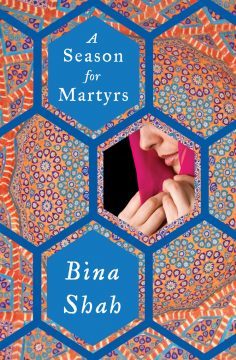 working for news channel City 24 to cover the story of Benazir’s return to Pakistan after eight years of self-exile in Dubai. His father, Sikandar, is a Sindhi zamindar, who is such a fan of the Bhutto family that Ali thinks he ‘sounds like he’s in love with’ Sindh’s ‘prodigal daughter’ Benazir. Since Sikandar has deserted the family and taken a second wife, one of Ali’s small rebellions against his absent father is to spurn the PPP leader, finding her face on posters triggering and her voice ‘strident and demanding’. He ventures out to report on the ‘tamasha’ generated by the vast crowds gathering to greet Benazir, even though he is alert to the assignment’s danger and knows about Pakistani Taliban leader Baitullah Mehsud’s threats to attack the PPP leader on her arrival in Karachi. His colleague Haroon goes missing, presumed dead, amid the carnage of the attempt on Benazir’s life on 18 October, leaving Ali traumatized.
working for news channel City 24 to cover the story of Benazir’s return to Pakistan after eight years of self-exile in Dubai. His father, Sikandar, is a Sindhi zamindar, who is such a fan of the Bhutto family that Ali thinks he ‘sounds like he’s in love with’ Sindh’s ‘prodigal daughter’ Benazir. Since Sikandar has deserted the family and taken a second wife, one of Ali’s small rebellions against his absent father is to spurn the PPP leader, finding her face on posters triggering and her voice ‘strident and demanding’. He ventures out to report on the ‘tamasha’ generated by the vast crowds gathering to greet Benazir, even though he is alert to the assignment’s danger and knows about Pakistani Taliban leader Baitullah Mehsud’s threats to attack the PPP leader on her arrival in Karachi. His colleague Haroon goes missing, presumed dead, amid the carnage of the attempt on Benazir’s life on 18 October, leaving Ali traumatized.
After that, Ali can no longer neutrally broadcast his country’s news, and becomes involved in ‘smart protests’ for the fictional People’s Resistance Movement group in support of the lawyers and judges protesting against President Pervez Musharraf. He even develops a ‘grudging … admir[ation]’ for Benazir, whose corruption he begins to think she may have put behind her as she tries to find ‘redemption’ in reinstating democracy to Pakistan with a third term in power. The novel emphasizes the politician’s strength, bravery, and pride: qualities which are all the more remarkable in the conservative subsoil of rural Sindh from which this daughter of Larkana springs. At one moment, Ali cannot decide whether she is best characterized as a saint, a queen, or a mother. Yet a certain ambivalence persists, since when Musharraf declares his national emergency and suspends both the constitution and the upcoming elections, the twenty-five year-old curses all politicians: ‘I don’t want to listen to what any of these bastards have to say’.
The novel then spools back through history to encompass the story of Benazir’s father, Zulfikar Ali Bhutto. ZAB became president after the break-up of the country following the Bangladesh Liberation War of 1971. Swept into power as prime minister in 1973 on a populist wave under the slogan Roti, kapra, aur makan (‘Bread, clothes, and housing’), Ali claims ZAB’s ‘talk … about socialism and equality’ was mere hypocrisy because ‘Bhutto … acted like the worst kind of dictator when he was in power’. Sikandar views him through a rosier-tinted lens, having gone to the family home to condole with Benazir after ZAB’s death. The fifty-one year-old was hanged in 1979 by President Muhammad Zia-ul-Haq, who had deposed him in a coup two years earlier. Though she holds herself erectly, the young ‘Bibi’s’ grief at her father’s murder is palpable as she listens to Sikandar’s made-up story of ZAB as a ‘brilliant man’ who ‘spoke eloquently’ as he faced death. This account echoes an archival BBC interview in which Benazir expressed similar sentiments, speaking of her father as follows: ‘He was so brilliant … he talked so beautifully. When he would talk, it would be like poetry. And I just couldn’t believe that you can just snuff out … snuffing out brilliance: it’s unbelievable’.
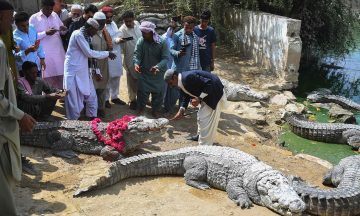
Towards the end of the novel, readers delve more deeply into history in the chapter ‘The Eighth Queen’ where they meet a seven-year-old Benazir. The child goes by a pet name Pinky, to which family nickname Benazir’s niece Fatima Bhutto has also referred in her memoir Songs of Blood and Sword. Despite the unfamiliar moniker, it is easily discernible who this is, given that the girl has younger siblings named Mir, Sunny, and Shah. Pinky is eager to visit the Shrine of the Crocodiles at Manghopir in north Karachi with the Sheedi servant Yusuf and other members of the family’s domestic help. (Interestingly, Fatima Bhutto has also written about the Shrine of Manghopir and the Sheedi community in her essay for Granta’s special issue about Pakistan from 2010.) Unwilling to fulfill the child’s request, the servants instead take her to a parrot-keeping fortune teller. This charlatan or seer frightens Pinky by predicting that she will become a powerful eighth queen, successor to the seven queens the Sufi poet Shah Abdul Latif Bhitai wrote about in his Shah Jo Risalo.
At the novel’s end, we see this prediction come true as an older and heavier but still regal Benazir steps out to face an adoring crowd at a political rally in Liaqat Bagh in Rawalpindi. It is clear that Shah has watched the footage of Benazir’s iconic final speech very closely, as she writes that the leader-in-waiting ‘perform[s] this trademark maneuver [of adjusting her white dupatta] at least two dozen times in [its] course’. Having initially watched her with some detachment, Ali suddenly realizes he wants to talk to her:
to tell her he had been wrong about her before, that he agreed with everything she was saying. She deserved a second chance, and a third, and a fourth, just like he did, just like everyone else did. Her whole life had been about struggle and about perseverance, and who could have gotten things right the first time round? Just by standing here today, she had done more than most leaders had achieved after a lifetime of power. But more than that, he longed to tell her his story: that he knew what it was like to lose a father, to be lost and adrift and struggling at sea, and then, finally, to see the shore and begin swimming towards it with all one’s might.
Here the famous leader is rendered as a fatherless woman, a flawed but sincere human being. Shortly after Ali has this epiphany, the narrative cuts off just before the explosion, making the reader’s knowledge of what is to come all the more harrowing.
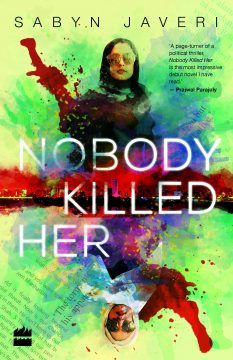
A not-Benazir takes centre stage in Sabyn Javeri’s Nobody Killed Her. As is suggested in the intriguing title, with its nonspecific personal pronoun and the denial of culpability that simultaneously draws attention to a murder, this is an oblique view of the powerful woman. And in the Acknowledgements there are hints of the book’s bumpy route to publication, as Javeri alludes to ‘the legal eagles who deemed it unpublishable (and in doing so made me revise it to a better story)’. This novel, then, is a work of biofiction, which clearly contains parallels with the real case, as it centres on an assassinated woman prime minister, Rani Shah, but also showcases much invention as Rani’s tale is recounted by her right-hand woman. This woman’s name is Nazneen Khan, whereas Benazir had a close aide called Naheed Khan. It is there that the similarities end, though, for Javeri imagines the two women occasionally indulging in their tempestuous same-sex desire, and at other moments arguing bitterly.
Like Mohsin Hamid’s 2000 novel Moth Smoke, Nobody Kills Me’s narrative arc is intermittently framed by transcripts from a legal trial, in this case from Nazneen’s indictment for Rani’s murder. Again as in much of Hamid’s writing, there is extensive use of the second person mode of address in Javeri’s novel, as Nazneen hails Rani as ‘you’ and outlines the many injustices this rich and powerful woman visited upon her poor servant. The intertextual web tightens, for Javeri at times appears to be rewriting Shakespeare’s Macbeth. A social-climbing Nazneen dreams of ‘witches and mists, of daggers and bloodstained cloaks’ and Rani invokes the disclaimer about ‘no man born of a woman’s womb’ amid the backstabbing ruthlessness and unbridled ambition of Pakistan’s political scene.
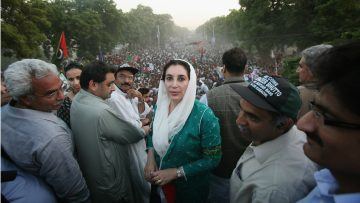 In a way, this is a roman à clef, although the novel is no straightforward code to be cracked and many of the details are pure contrivances. But Javeri clearly evokes Benazir’s machinations over the Kalabagh Dam project in her references to a literally-translated Blackgarden Dam. Rani’s antagonists are an unnamed General (Zia), his Jihadists (Zia’s supporters from the Jamaat-i-Islami), and a shadowy Secret Service (the ISI) who watch Rani’s activities in the again unnamed city by the sea (Karachi). Like Zia, this General is killed when his aeroplane is mysteriously blown up by a case of exploding mangoes. However, Javeri embellishes the historical record by intimating Rani/Benazir’s hand in the murder and moving the fatal date from 1988 to 1992. As with Benazir’s husband Asif Ali Zardari, Rani marries a venal, voracious, and voluptuary man known as the Reed who goes on to cultivate her worst behaviour. Rani has a miscarriage before taking office rather than being pregnant while in power as Benazir was. Against this complex tapestry of fact and fiction, Javeri weaves in stories of feminism, rape, mental illness, and motherhood. Because this is a shadow-world, akin to but not the same as the real Pakistan, I must now draw a veil over its denouement lest I spoil the novel for future readers.
In a way, this is a roman à clef, although the novel is no straightforward code to be cracked and many of the details are pure contrivances. But Javeri clearly evokes Benazir’s machinations over the Kalabagh Dam project in her references to a literally-translated Blackgarden Dam. Rani’s antagonists are an unnamed General (Zia), his Jihadists (Zia’s supporters from the Jamaat-i-Islami), and a shadowy Secret Service (the ISI) who watch Rani’s activities in the again unnamed city by the sea (Karachi). Like Zia, this General is killed when his aeroplane is mysteriously blown up by a case of exploding mangoes. However, Javeri embellishes the historical record by intimating Rani/Benazir’s hand in the murder and moving the fatal date from 1988 to 1992. As with Benazir’s husband Asif Ali Zardari, Rani marries a venal, voracious, and voluptuary man known as the Reed who goes on to cultivate her worst behaviour. Rani has a miscarriage before taking office rather than being pregnant while in power as Benazir was. Against this complex tapestry of fact and fiction, Javeri weaves in stories of feminism, rape, mental illness, and motherhood. Because this is a shadow-world, akin to but not the same as the real Pakistan, I must now draw a veil over its denouement lest I spoil the novel for future readers.
Benazir Bhutto, like Walt Whitman’s Self, had an internal life full of contradictions, and contained multitudes. Whatever her faults – and they were both legion and writ large – it would take a hard-hearted person not to be moved by the steeliness with which she confronted likely assassination to keep going, undaunted, in her political campaigning. Small wonder, then, that in the thirteen years since her killing, women writers have kept going back to her life and death for inspiration.
